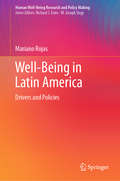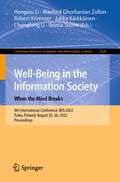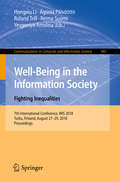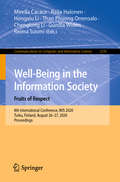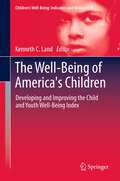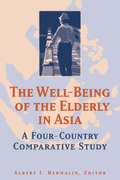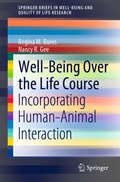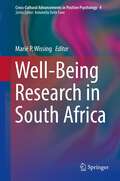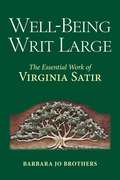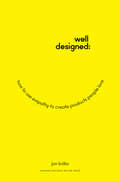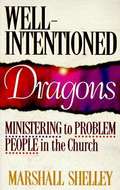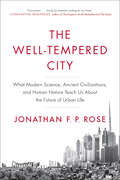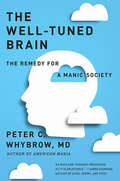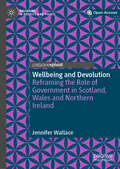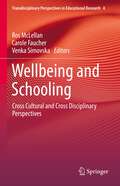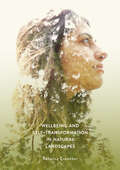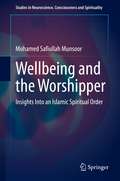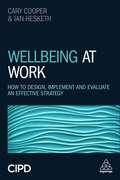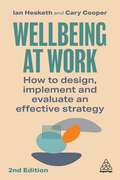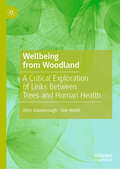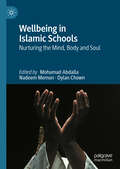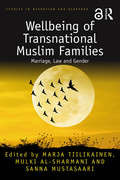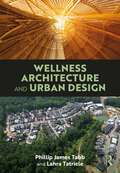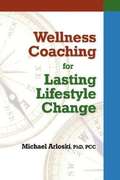- Table View
- List View
Well-Being in Latin America: Drivers and Policies (Human Well-Being Research and Policy Making)
by Mariano RojasThis book provides an overview of factors fostering well-being in Latin America and discusses many threats to well-being in the region. The book assesses the current well-being situation in Latin American countries and offers an explanation based on its many drivers, such as family arrangements, kindness and affection of interpersonal relations, economic situation, education regimes, political institutions, poverty, income inequality, crime and violence, and the weakness of political institutions. The book provides a framework to fully understand the drivers behind high well-being, including the challenges and opportunities that public policy faces in the procurement of people’s well-being. The book provides relevant material for policymakers and social scientist interested in the procurement of well-being.
Well-Being in the Information Society: 9th International Conference, WIS 2022, Turku, Finland, August 25–26, 2022, Proceedings (Communications in Computer and Information Science #1626)
by Hongxiu Li Maehed Ghorbanian Zolbin Robert Krimmer Jukka Kärkkäinen Chenglong Li Reima SuomiThis book constitutes the refereed proceedings of the 9th International Conference on Well-Being in the Information Society, WIS 2022, held in Turku, Finland, in August 2022. The 14 revised full papers presented were carefully reviewed and selected from 17 submissions. The proceedings are structured in four sections as follows: mental well-being and e-health; social media and well-being; innovative solution for well-being in the information society; driving well-being in the information society.
Well-Being in the Information Society. Fighting Inequalities: 7th International Conference, WIS 2018, Turku, Finland, August 27-29, 2018, Proceedings (Communications in Computer and Information Science #907)
by Hongxiu Li Ágústa Pálsdóttir Roland Trill Reima Suomi Yevgeniya AmelinaThis book constitutes the refereed proceedings of the 7th International Conference on Well-Being in the Information Society, WIS 2018, held in Turku, Finland, in August 2018.The 19 revised full papers presented were carefully reviewed and selected from 42 submissions. With the core topic "Fighting Inequalities" WIS 2018 focused on innovations and fresh ideas in the cross-section of information society and health as understood in a wide sense. The papers presented in this volume are organized along the following broad topics: digital society and e-health.
Well-Being in the Information Society. Fruits of Respect: 8th International Conference, WIS 2020, Turku, Finland, August 26–27, 2020, Proceedings (Communications in Computer and Information Science #1270)
by Mirella Cacace Raija Halonen Hongxiu Li Thao Phuong Orrensalo Chenglong Li Gunilla Widén Reima SuomiThis book constitutes the refereed proceedings of the 8th International Conference on Well-Being in the Information Society, WIS 2020, held in Turku, Finland, in August 2020. Due to the COVID-19 pandemic the conference was held online. The 19 revised full papers presented were carefully reviewed and selected from 25 submissions. The submitted papers present academic contributions on the topics of intersection of health, ICT and fruits of respect as seen from different directions and contexts. The paperd are organized in the following topical sections: improving quality and containing cost in health care and care for the elderly by using information technology; collecting the fruits of respect in entrepreneurship and management of organizations; friend or foe: society in the area of tension between free data movement and data protection; bridging the digital divide: strengthening (health-) literacy and supporting trainings in information society.
The Well-Being of America's Children
by Kenneth C. LandIn 1998, the Foundation for Child Development (FCD) provided Kenneth Land a grant to explore the feasibility of producing the first national composite index of the status of American children that would chart changes in their well-being over time. Important questions needed to be answered: was it possible to trace trends in child and youth well-being over several decades? Could such an index provide a way of determining whether the United States was making progress in improving its children's lives? The Index of Child and Youth Well-Being (CWI) was born from these questions. Viewing the CWI trends from 1975 to present, there is evidence that the well-being of American children lags behind other Western nations. As conditions change, it is clear that the index is an evolving and rich enterprise. This volume attests to that evolution, and what the CWI promises for understanding the progress - or lack of progress - in enhancing the life prospects of all American children.
The Well-Being of the Elderly in Asia: A Four-Country Comparative Study
by Albert I. HermalinThe past two decades have witnessed rapid social, economic, and demographic change in East and South-East Asia. The older populations in these regions have been increasing faster than in the West, and the proportions of people over sixty will more than double over the next thirty years. Increased urbanization and educational levels and a strong shift to professional, technical, manufacturing, and service occupations are changing the social and economic landscape, leading to concern for the well-being of the elderly, who traditionally have relied on the family for support. Governments are attempting to preserve these traditions while taking into account widespread family change and new expectations for pension, health insurance, and other public programs. The contributors to this volume use survey and other data collected over ten years to examine the well-being of the current older population in four Asian countries: The Philippines, Singapore, Taiwan, and Thailand. Each major analytic chapter looks at a key dimension of well-being--economic, physical and mental health, work and leisure--and how these are affected by the familial and social support arrangements, as well as age, gender, education, and urban-rural residence. Where possible, changes over time are traced. Explicit attention is given to the policies and programs in place and under development in each country and to the cultural accommodations underway. The contributors also look ahead to the implications of the large numbers of elderly with very different characteristics who will predominate in the coming years and to the policy implications of this coming transformation. The book will be important for scholars and policymakers whose work involves population in Asia, including demographers, sociologists, and economists.
Well-Being Over the Life Course: Incorporating Human–Animal Interaction (SpringerBriefs in Well-Being and Quality of Life Research)
by Regina M. Bures Nancy R. GeeThis book provides a multidisciplinary overview of the impact of human–animal interaction on well-being from childhood to later life. It presents a life course perspective to the study of human–animal interaction, addressing concepts of family and the role of pets therein, as well as the impact of companion animals on child development and successful aging. This book fills a gap in the existing literature by framing the study of human–animal interaction, including the role of animal-assisted interventions on well-being, in a broader social and behavioral context.
Well-Being Research in South Africa
by Marié P. WissingThis is the first book to bring together examples of research in positive psychology / psychofortology conducted in the multi-cultural South African context with its diverse populations and settings. The volume reflects basic as well as applied well-being research in the multicultural South African context, as conducted in various contexts and with a variety of methods and foci. Theoretical, review, and empirical research contributions are made, reflecting positivist to constructivist approaches, and include quantitative, qualitative, and mixed-method approaches. Some findings support universality assumptions, but others uncovered unique cultural patterns. Chapters report on well-being research conducted in the domains of education, work, health, and family, and in clinical, urban vs. rural, and unicultural vs. multicultural contexts. Studies span the well-being of adolescents, adults, and older people, and topics include resilience in individuals, families, and groups, measurement issues and coping processes, the role of personal and contextual variables, and facets such as hope, spirituality, self-regulation, and interventions.
Well-Being Writ Large: The Essential Work of Virginia Satir
by Barbara Jo BrothersA comprehensive collection of Virginia Satir&’s research and teachings around the nature of humanity, author Barbara Jo Brothers has written the first ever tribute to the Mother of Family Therapy&’s life-work, capturing the essence of Satir&’s groundbreaking philosophies about the human race and the impact human&’s have on the Earth. In her career, the &“Mother of Family Therapy&” Virginia Satir strove to make life work better: for the individual, for families, for the entire world. With a training objective of &“becoming more fully human,&” Virginia believed that the principles for peace within families could be extrapolated to peace within the &“world family.&” Having formulated her groundbreaking philosophies from her clinical observations of hundreds of families in multiple countries, Virginia&’s practices continue to impact the world at large, spreading peace and understanding. More than just a testament to Virginia&’s legacy, Well-Being Writ Large is a window into her thinking—a &“biography&” of a deeper understanding of the nature of the human being and how that human being might live better in her or his world. Author, licensed clinical social worker, and Virginia scholar Barbara Jo Brothers has painstakingly researched and drawn from Virginia&’s works—including books, articles, interviews, and transcribed lectures—personal notes made over the course of Satir&’s career, and direct conversations during Brothers&’s own extensive residential training to compile the most complete, most essential collection of Virginia Satir&’s work.
Well-Designed
by Jon KolkoFrom Design Thinking to Design DoingInnovators today are told to run loose and think lean in order to fail fast and succeed sooner. But in a world obsessed with the new, where cool added features often trump actual customer needs, it's the consumer who suffers. In our quest to be more agile, we end up creating products that underwhelm.So how does a company like Nest, creator of the mundane thermostat, earn accolades like "beautiful" and "revolutionary" and a $3.2 billion Google buyout? What did Nest do differently to create a household product that people speak of with love?Nest, and companies like it, understand that emotional connection is critical to product development. And they use a clear, repeatable design process that focuses squarely on consumer engagement rather than piling on features for features' sake.In this refreshingly jargon-free and practical book, product design expert Jon Kolko maps out this process, demonstrating how it will help you and your team conceive and build successful, emotionally resonant products again and again.The key, says Kolko, is empathy. You need to deeply understand customer needs and feelings, and this understanding must be reflected in the product. In successive chapters of the book, we see how leading companies use a design process of storytelling and iteration that evokes positive emotions, changes behavior, and creates deep engagement. Here are the four key steps:1. Determine a product-market fit by seeking signals from communities of users.2. Identify behavioral insights by conducting ethnographic research.3. Sketch a product strategy by synthesizing complex research data into simple insights.4. Polish the product details using visual representations to simplify complex ideas.Kolko walks the reader through each step, sharing eye-opening insights from his fifteen-year career in product design along the way.Whether you're a designer, a product developer, or a marketer thinking about your company's next offering, this book will forever change the way you think about-and create-successful products.
Well-Designed: How to Use Empathy to Create Products People Love
by Jon KolkoFrom Design Thinking to Design Doing Innovators today are told to run loose and think lean in order to fail fast and succeed sooner. But in a world obsessed with the new, where cool added features often trump actual customer needs, it’s the consumer who suffers. In our quest to be more agile, we end up creating products that underwhelm. So how does a company like Nest, creator of the mundane thermostat, earn accolades like "beautiful” and "revolutionary” and a $3. 2 billion Google buyout? What did Nest do differently to create a household product that people speak of with love? Nest, and companies like it, understand that emotional connection is critical to product development. And they use a clear, repeatable design process that focuses squarely on consumer engagement rather than piling on features for features’ sake. In this refreshingly jargon-free and practical book, product design expert Jon Kolko maps out this process, demonstrating how it will help you and your team conceive and build successful, emotionally resonant products again and again. The key, says Kolko, is empathy. You need to deeply understand customer needs and feelings, and this understanding must be reflected in the product. In successive chapters of the book, we see how leading companies use a design process of storytelling and iteration that evokes positive emotions, changes behavior, and creates deep engagement. Here are the four key steps: 1. Determine a product-market fit by seeking signals from communities of users. 2. Identify behavioral insights by conducting ethnographic research. 3. Sketch a product strategy by synthesizing complex research data into simple insights. 4. Polish the product details using visual representations to simplify complex ideas. Kolko walks the reader through each step, sharing eye-opening insights from his fifteen-year career in product design along the way. Whether you’re a designer, a product developer, or a marketer thinking about your company’s next offering, this book will forever change the way you think about-and create-successful products.
Well-Intentioned Dragons
by Marshall ShelleyPastors, deacons, and other church workers will find this book a valuable resource in dealing with problem people in the church. Conflict resolution is dealt with in a very positive manner.
The Well-Tempered City: What Modern Science, Ancient Civilizations, and Human Nature Teach Us About the Future of Urban Life
by Jonathan F. Rose“A thorough education in how to move from simply maximizing the economic output of cities to improving the well-being of all urban residents.” —Daniel L. Doctoroff, CEO, Sidewalk Labs2017 PROSE Award Winner: Outstanding Scholarly Work by a Trade Publisher Cities are birthplaces of civilization; centers of culture, trade, and progress; cauldrons of opportunity—and the home of eighty percent of the world’s population by 2050. As the twenty-first century progresses, metropolitan areas will bear the brunt of global megatrends such as climate change, natural resource depletion, population growth, income inequality, mass migrations, education and health disparities, among many others. In The Well-Tempered City, Jonathan F. P. Rose—the man who “repairs the fabric of cities”—distills a lifetime of interdisciplinary research and firsthand experience into a five-pronged model for how to design and reshape our cities with the goal of equalizing their landscape of opportunity. Drawing from the musical concept of “temperament” as a way to achieve harmony, Rose argues that well-tempered cities can be infused with systems that bend the arc of their development toward equality, resilience, adaptability, well-being, and the ever-unfolding harmony between civilization and nature. These goals may never be fully achieved, but our cities will be richer and happier if we aspire to them, and if we infuse our every plan and constructive step with this intention. A celebration of the city and an impassioned argument for its role in addressing the important issues in these volatile times, The Well-Tempered City is a reasoned, hopeful blueprint for a thriving metropolis—and the future.“A thought-provoking introduction to the future of cities.” —Publishers Weekly
The Well-Tuned Brain: Neuroscience and the Life Well Lived
by Peter C. WhybrowIn this optimistic and inspiring book, Peter Whybrow, the prize-winning author of American Mania, returns to offer a prescription for genuine human progress. The Well-Tuned Brain is a call to action. Swept along by the cascading advances of today's technology, most of us take for granted that progress brings improvement. Despite spectacular material advance, however, the evidence grows that we are failing to create a sustainable future for humanity. We are out of tune with the planet that nurtures us. Technology itself is not the problem, as Whybrow explains, but rather our behavior. Throughout its evolution the ancient brain that guides us each day has been focused on short-term survival. But fortunately we are intensely social creatures. Without the caring behaviors that flow from intimate attachments to others, we would be relying on a brain that is only marginally adapted to the complexity of the problems we must now face together. Today we must grapple with survival, not in its immediacy but over the long term. The first step in finding our way forward is to reexamine who we are as creatures of this planet. To this end, Whybrow takes us on a fascinating tour of self-discovery, drawing extensively upon his decades of experience as a psychiatrist and his broad knowledge of neuroscience and human behavior. Illustrated throughout with engaging personal stories, the book's trove of cutting-edge science is enriched by philosophical, historical, and cultural perspectives. What emerges is a summons to rediscover the essential virtues of earlier nurturing, of mentored education, and an engagement with the natural world through curiosity and imagination. Neuroscience can open the search for a better future. But technology alone will not save us. To achieve success we will need the strength and wisdom of our better nature as humane social beings.
Wellbeing and Devolution: Reframing the Role of Government in Scotland, Wales and Northern Ireland (Wellbeing in Politics and Policy)
by Jennifer WallaceIt has been over twenty years since the people of Scotland, Wales and Northern Ireland voted for devolution. Over that time, the devolved legislatures have established themselves and matured their approach to governance. At different times and for different reasons, each has put wellbeing at the heart of their approach – codifying their values and goals within wellbeing frameworks. This open access book explores, for the first time, why each set their goal as improving wellbeing and how they balance the core elements of societal wellbeing (economic, social and environmental outcomes). Do the frameworks represent a genuine attempt to think differently about how devolved government can plan and organise public services? And if so, what early indications are there of the impact is this having on people’s lives?
Wellbeing and Schooling: Cross Cultural and Cross Disciplinary Perspectives (Transdisciplinary Perspectives in Educational Research #4)
by Ros McLellan Carole Faucher Venka SimovskaCollectively, the research presented in this book revisits, challenges, and rearticulates taken-for-granted wellbeing conceptualisations, policies and intervention frameworks, as critical discussion of wellbeing in relation to children and young people from a variety of socio-cultural, political, and economic settings is still relatively sparse. The contributions work synergistically to generate a sophisticated understanding of children’s wellbeing while introducing fresh and context-sensitive approaches. Pre-conceived and taken-for-granted notions of wellbeing are problematised through four sections in (i) Re-examining conceptualisations of wellbeing in educational research and policy; (ii) Focusing on School environments, schooling, and wellbeing; (iii) Examining the significance of cultural contexts; and (iv) Amplifying children's voices. The objective is to help generate new ways of researching and thinking about wellbeing and schooling, that transcend monocultural, monodisciplinary and monomethodological strategies. The book aims to stimulate further theoretical and empirical research, as well as development of effective policies and school interventions which nuance rather than reduce complexity of both education and wellbeing.
Wellbeing and Self-Transformation in Natural Landscapes
by Rebecca CrowtherThis book explores how natural landscapes are linked to positive mental wellbeing. While natural landscapes have long been represented and portrayed as transformative, the link to mental wellbeing is an area that researchers are still aiming to comprehend. Accompanying five groups of people to rural Scotland, the author considers individual, external and group motivations for journeying from urban environments, examining in what ways these excursions are personally and socially transformative. Far more than traversing mere physical boundaries, this book illustrates the new challenges, experiences, territories and cultures provided by these excursions, firmly anchored in the Scottish countryside. In doing so, the author questions the extent to which people’s own narratives link to the perception that the outdoors are positively transformative – and what indeed does have the power to influence transformation. Grounded in extensive qualitative research, this contemplative and ethnographic book will be of interest and value to students and scholars of the outdoors and its connection to wellbeing.
Wellbeing and the Worshipper: Insights Into an Islamic Spiritual Order (Studies in Neuroscience, Consciousness and Spirituality #7)
by Mohamed Safiullah MunsoorThis is a rare piece of empirical research, which reveals the workings of a spiritual order, its leadership, as well as their approaches, methods and tools. It demonstrates how the seekers, who were partly drug addicts and HIV patients, and the general segment of this Order, have been able to positively transform themselves. A multidisciplinary approach enlightens the analysis and discussion by bringing together spirituality, psychology, neuroscience as well as organisational development, to produce a rich tapestry of first hand insights. This book provides an integrated approach to understanding the landscape of a spiritual order primarily using a mixed method and a holistic approach with a particular focus on Islam. Qualitative examples include interpretivistic phenomenological approaches and neuro-linguistic programming. The book highlights the positive impact of worship by providing practical guidance and suggestions on how to spiritually improve oneself. This dualistic approach generated a working model for spiritual leadership and self-development. The unsuspecting but important link of spirituality to the United Nations sustainable development goals (SDGs) is highlighted and discussed, which needs to be factored into the global development narrative. The text is primarily for researchers, yet has a secondary use for students and general readership given the comprehensive review establishing a conceptual framework for worship and morality.
Wellbeing at Work: How to Design, Implement and Evaluate an Effective Strategy
by Cary Cooper Ian HeskethStress at work is rising year on year, long hours are becoming the norm and presenteeism is increasing across all industries. This is not only having a detrimental effect on employee health, happiness and productivity, but is also impacting the bottom line. HR professionals are uniquely placed to manage this modern workplace crisis by implementing a wellbeing strategy. Wellbeing at Work is an essential, practical guide to designing and implementing an effective strategy that will reduce employee anxiety, increase staff engagement and improve overall performance.Written by leading experts in the field, Wellbeing at Work takes readers through the entire process, from explaining why a wellbeing strategy is necessary in a fast-changing world of work and technological transformation to building momentum around it, and monitoring, measuring and evaluating its impact. The book also identifies common pitfalls and problems, and how to avoid them, explores important legislative considerations and provides example exercises and tools to use throughout the process. Full of advice, tips and insights from real-world case studies, this is the only book you will need to create a happier, more productive and more profitable organization.
Wellbeing at Work: How to Design, Implement and Evaluate an Effective Strategy
by Ian Hesketh Cary CooperWith employee wellbeing at the forefront, Wellbeing at Work is the succinct and practical guide to designing and implementing an effective strategy that will help reduce workplace stress and improve overall performance.This book not only explains the reasons to consider employee mental health and wellbeing in the workplace but states why it is vital and draws from a people's approach on how to provide a clear framework to increase staff engagement. Updated by experts with the latest research, insightful approaches and key takeaways, this new edition illustrates how managers and leaders can introduce and maintain the right environment to reduce presenteeism and employee anxiety, as well as positively influence employees' overall wellbeing.Filled with advice and case studies pertaining to the effects of hybrid working, and how to effectively manage employees without jeopardizing their wellbeing, this second edition takes readers through the entire process of improving wellbeing at work.
Wellbeing from Woodland: A Critical Exploration of Links Between Trees and Human Health
by Alice Goodenough Sue WaiteThis book provides a framework for understanding the components of woodland wellbeing. Based around the collaborative project, Good from Woods, the book spotlights multiple case studies to explore how wellbeing and health are promoted in woodland settings and through woodland inspired activity. It illustrates forms of wellbeing through real examples of woodland practice and draws out implications for the design of programmes to support health and wellbeing across different client groups. Chapters discuss health and wellbeing from a variety of perspectives such as psychological, physical, social, emotional and biophilic wellbeing.The book will be of great practical use to commissioners, providers and users of woodland based activity who want to take a deeper look into how trees, woods and forests support human health and happiness, as well as of interest to academics and students engaged in research in outdoor activities, urban forestry and natural health and wellbeing.
Wellbeing in Islamic Schools: Nurturing the Mind, Body and Soul
by Mohamad Abdalla Nadeem Memon Dylan ChownIslamic schools are growing exponentially in the West to meet the demands of Muslim learners and their parents. Today, there are hundreds of Islamic schools that are constantly expanding. A key focus of the philosophy of Islamic schools and education is the nurturing of the mind, body and soul. Yet, to date, there is no book that addresses the issue of well-being in Islamic schools. This book provides a comprehensive approach to well-being and highlights both academic and practitioners’ findings, thoughts and experiences as well as school/classroom-based examples related to well-being in Islamic schooling.
Wellbeing of Transnational Muslim Families: Marriage, Law and Gender (Studies in Migration and Diaspora)
by Mulki Al-Sharmani Sanna Mustasaari Marja TiilikainenThis book examines the needs, aspirations, strategies, and challenges of transnational Muslim migrants in Europe with regard to family practices such as marriage, divorce, and parenting. Critically re-conceptualizing ‘wellbeing’ and unpacking its multiple dimensions in the context of Muslim families, it investigates how migrants make sense of and draw on different norms, laws, and regimes of knowledge as they navigate different aspects of family relations and life in a transnational social space. With attention to issues such as registration of marriage, civil versus religious marriage, spousal roles and rights, polygamy, parenting, child wellbeing, and everyday security, the authors offer national and comparative case studies of Muslim families from different parts of the world, covering different family bonds and relations, within both extended and nuclear families. Based on empirical research in the Nordic region and further afield, this volume affords a more complete understanding of the practices of transnational migrant families, as well as the processes through which family relations and rights are negotiated between family members and with state institutions and laws, whilst contributing to the growing literature on migrant wellbeing. As such, it will appeal to scholars of sociology and social policy with interests in migration and transnational communities, wellbeing, and the family.
Wellness Architecture and Urban Design
by Phillip James Tabb Lahra TatrieleWellness is a contemporary concept with deep ancient roots promoting preventative and holistic activities, lifestyle choices, and salient architecture and urban design practices. Wellness Architecture and Urban Design presents definitions, an analysis of the wellness literature, and a brief history of the wellness movement. Specific planning and design strategies are presented citing examples worldwide and emphasizing the importance of wellness considerations at all scales of the built environment from rooms to cities. Both case studies offer fully integrated and comprehensive wellness design approaches creating resilient and life-enhancing wellness through each of the architecture and urban design scales. The book will be of interest to practitioners and students working in urban design, landscape architecture, architecture, planning, and affiliated fields.
Wellness Coaching for Lasting Lifestyle Change
by Michael ArloskiFor the first time the principles of wellness promotion and personal life coaching are brought together in one volume. Guided by his long experience as a wellness coach, Dr. Arloski blends the wisdom of the coaching profession to bring us an easy-to-use training tool perfect for: wellness professionals, professional coaches, managers, EAP professionals, counselors, and wellness educators. The coaching processes outlined in the book will help you work with your clients to empower them to draw on his or her own abilities and resources to make lasting changes for better health.
